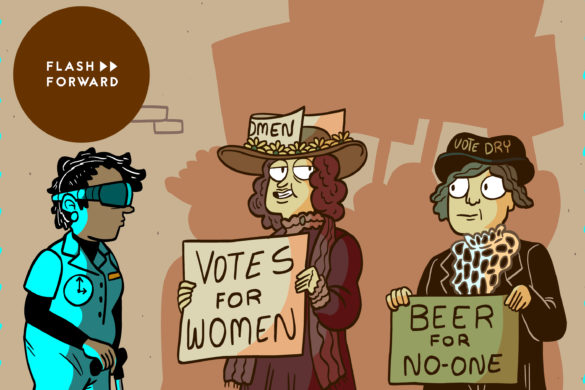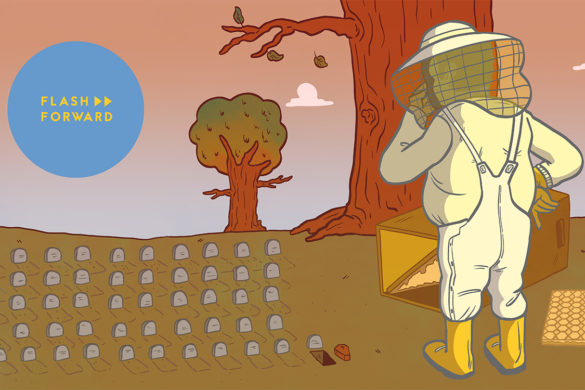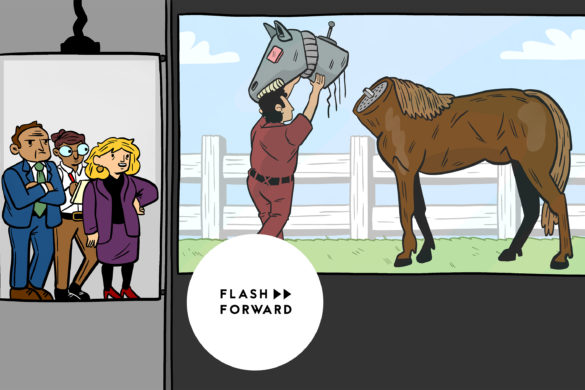Today is a very special ~~surprise~~ episode! I’ve been thinking about how to revisit old episodes, and give you folks updates on things that have happened since we covered certain futures. Sometimes things warrant more than a social media post, but not quite a whole new episode. So here’s a little experiment! On this episode, we revisit three futures and you get some juicy, fresh updates. We talk about a mosquito experiment gone wrong, a UBI experiment gone right, and what the heck is going on with coronavirus.
If you like this, let me know? There are a few other episodes I think are worth an update (The census is this year! A DNA testing company we covered was bought out by a lab that works with law enforcement! People in Sweden are flying way less!) and if you like this I’ll definitely do another.
Sources:
- Dr. Cameron Webb — mosquito expert, University of Syndey
- Dr. Amy Castro Baker — assistant professor at University of Pennsylvania
- Dr. Stacia Martin-West — assistant professor at University of Tennessee, Knoxville
- Dr. Alexandra Phelan — Center for Global Health Science and Security, Georgetown University
Further Reading: MOSQUITOS
- The Ultimate Swatting ~~ original Flash Forward episode
- Study on DNA spread by genetically modified mosquitoes prompts backlash
- Transgenic Aedes aegypti Mosquitoes Transfer Genes into a Natural Population (the paper in question)
- Transgenic mosquitoes pass on genes to native species (a press release for the paper in question)
- Oxitec’s response to the paper
- Brazilian author asks for retraction of Oxitec mosquito paper
- Wolbachia-a foe for mosquitoes
- Pitting mozzies against mozzies to stop the spread of disease
- Wolbachia-Infected Mosquito Release Shows Encouraging Results
Further Reading: UBI
- Money For Nothing ~~ original Flash Forward episode
- Stockton Economic Empowerment Demonstration portal & stats
- How is the $500 impacting people?
- Michael Tubbs on universal basic income: ‘The issue with poverty is a lack of cash’
Further Reading: CORONAVIRUS
- The Very Big Sick ~~ original Flash Forward episode
- WHO Coronavirus Dashboard
- Trump bans foreign nationals who have traveled to China from entering the US
- Fear of coronavirus fuels racist sentiment targeting Asians
- The New Coronavirus Is a Truly Modern Epidemic
- The Deceptively Simple Number Sparking Coronavirus Fears
- Why Travel Bans Don’t Work During An Outbreak Like Coronavirus
- A Historic Quarantine
- China, Desperate to Stop Coronavirus, Turns Neighbor Against Neighbor
- The Novel Coronavirus Originating in Wuhan, ChinaChallenges for Global Health Governance
- China’s Xi Tells Trump Beijing Will Defeat Coronavirus as Doctor’s Death Sparks Outcry
- Experts envision two scenarios if the new coronavirus isn’t contained
- Three Scenarios For The Coronavirus
- Coronavirus brings China’s surveillance state out of the shadows
- Coronavirus Is Bad. Comparing It to the Flu Is Worse
Flash Forward is produced by me, Rose Eveleth. The intro and outro music for this episode were created by Hussalonia.
If you want to support the show, there are a few ways you can do that too! Head to www.flashforwardpod.com/support for more about how to give. But if that’s not in the cards for you, you can head to iTunes and leave us a nice review or just tell your friends about us. Those things really do help.
I’ll be back with regular episodes April 14th, so stay tuned!
TRANSCRIPT
Rose: Hi! It’s Rose, your intrepid host of this podcast, emerging from my time travel machine. I have been trekking into the timeline, spying on our future selves, and preparing the next season Flash Forward of episodes just for you! By the way, Alex, don’t eat that shrimp in Barcelona, it will not end well for you. The show will be back officially on April 14th, so mark your calendars, text your friends, prepare your celebratory cake recipes, that’s when the season begins again. But in the meantime, I wanted to surprise you with a little bonus episode.
If this is the first episode of Flash Forward that you’ve ever heard, just know that this is not the normal format! This is something I’m trying out, it’s a little bit of an experiment, so if you like it, let me know, and if you hate it, don’t worry, the show will be back to normal soon.
So what is this, why am I here talking to you? Well, the weird thing about the future, is that it just keeps happening, like… all the time. And Flash Forward is now almost five years old. So there are episodes from earlier seasons about futures that have kind of happened. Or futures where there have been some really cool, interesting developments. Sometimes those updates are big enough to deserve a whole new episode — so I did a second episode on facial recognition last year, for example. But other times they’re just really interesting updates that I want to tell you about. I do often post articles that touch on stuff we’ve covered on the Facebook page or on Twitter, but there are some developments that I think warrant a little bit more … not quite their own episode, but more than just a social media post.
So this is the first of maybe a couple little episodes that go back and revisit a few past futures, and tell you what’s happened since then. You do not have to have heard those earlier episodes to understand what’s going on on this episode, I promise, although of course it will help. Does that make sense? So … on this Flash Back to the Future extravaganza we’re going to revisit three different stories that I once talked about on the show, that have had some interesting thing happen. We’re going to talk about genetically modified mosquitos, you’re going to get an update on a Universal Basic Income experiment we talked about a couple of years ago, and of course we’re going to cover the possible pandemic that is coronavirus. Sound fun? The last thing probably doesn’t sound very fun, but at least a little interesting. Okay… let’s get into it!
[music fade out]
We’re going to start with everybody’s least favorite insect. Or at least my least favorite insect.
Look, I love bugs. I will hold any creepy crawly insect that you let me, I have a pretty large bug tattoo, I cohabitate with an office spider who I have named Janine. But man… mosquitoes. They’re very, very hard to love!
Waaaay back in 2016 we did an episode about what would happen if we just… got rid of every single mosquito in the entire world. Would that really be so bad? And is it even possible?
So you might have heard that mosquitoes kill more humans than any other species in the world — including humans themselves. Mosquito borne diseases kill anywhere from 725,000 to a million to two million people every year. And if you’re like, wait, those numbers are … pretty different from one another, you’re not alone. I actually fell down a little bit of a rabbit hole trying to fact check this claim and figure out where these numbers come from. What counts towards the mosquito’s body count, and who measures that? Most places cite the Bill and Melinda Gates foundation, and they cite the World Health Organization, who compiles deaths due to vector borne diseases, which includes mosquitos.
But here’s where I have to come to the mosquitoes defense a little. Because in this comparison, the one that says that mosquitoes kill more humans than humans do, they only count homicide towards the human deaths. They don’t count things like car accidents or suicide or humans transmitting diseases to other humans. Which seems weird to me since we’re counting mosquitoes transmitting diseases to humans towards their number? So we’re sort of comparing apples and oranges here?
Anyway, what we can say is that a lot of people die every year due to mosquitoes, so there are a lot of people working on this problem, and trying to figure out how to decrease that number, whatever it may be. Obviously there are efforts to use chemicals that will kill the mosquitoes, there are local projects to educate people about not leaving pools of water around, where mosquitoes can breed, and there are NGOs that distribute mosquito nets for people to use while sleeping so they can avoid the dastardly buggers at night.
And on the 2016 episode, we talked a little bit about another method. And that’s genetic modification. And probably one of the most famous programs for this is by a company called Oxitec,
[From original episode]
Hadyen Parry: So, what this means is we release males, because male mosquitoes don’t bite you; only females do. So, we release the males carrying this self limiting gene. They go off. They mate with females, and then all of the offspring die.
Rose: That’s Hadyn Parry from our 2016 episode. At the time he was the CEO of Oxitec, a role he left in 2017.
The idea behind the project here is that when these genetically modified mosquitoes saturate the environment, and mate with the locals, they basically crash the population, since all of their offspring die. In theory, after a few generations, this undercover mosquito has totally decimated the local population wherever they’ve been released. It’s a pretty cool idea, because it reduces the amount of toxic chemicals that you’re dumping into the environment to try and kill these blood suckers. Basically, you’re using the mosquitoes as like an insecticide, against themselves.
That is the theory, at least. But last year, there was some news on this project that you might have actually heard about. And to talk about that news, I called up another person you heard on that original episode, Dr. Cameron Webb.
[From original episode]
Cameron Webb: You know, if a drunk person passes out on the edge of the wetland, are they going to die from blood loss because of the mosquitoes?
Rose [on the phone]: People ask you that?
Cameron: Yeah, thats one of the questions people ask me.
Rose [on the phone]: I’m guessing the answer is no.
Cameron: No, I don’t think so.
Rose [on the phone]: [Laughter] Okay, I won’t worry, then.
Rose: So Cameron is not involved in this program nor does he work for Oxitec, but he has been following the case and the controversy. So here’s what happened.
In the lab, this idea works really well. But, as with so much of science, you don’t really know how it will go until you try it in the wild.
Cameron: Once they get into the environment, you don’t know how well they’re mating with the wild mosquitoes. Do they survive as long? All of these factors that change the effectiveness of that approach… it’s just almost impossible to predict until you actually do it.
Rose: Back in 2013, Oxitec started releasing these mosquitoes in a city called Jacobina, in the Eastern part of Brazil. And they didn’t just release a couple of mosquitoes, they released a ton.
Starting in June of 2013, Oxitec released about 450 thousand modified male mosquitoes every week for 27 months. That’s a grand total of about 53 million insects.
Cameron: You want to get as many of those out into the nooks and crannies of the environment, finding those female mosquitoes in the environment, mating with them. Because you want as much of that to occur as quickly as possible to get the most effective results from this strategy.
Rose: Oxitec has done its own studies on the effectiveness here, but the reason that this project was in the news last year is that an independent group of scientists decided that they also wanted to do their own check on what was going on in Jacobina. And what that study found, was something that Oxitec did not expect, and it set off a big kerfuffle. People were very upset, and some scientists even called for this paper to be retracted. You might have even seen scary headlines about the study, something about genetic material leaking into the environment. So let’s break it down, let’s first talk about what this study actually found.
Cameron: So, basically what the researchers found was that there were these genetic markers that indicate that there were traces of these laboratory bred mosquitoes still in the environment.
Rose: This is a big deal because the whole point of these genetically edited mosquitoes is that their offspring die. If there are traces of their genes still in the gene pool generations later, that means that some percent of those offspring did not die, and instead lived on and had more tiny mosquito babies.
So basically, the plan did not work quite as well as people had hoped. Which is really common in science, right? Why is this a big deal? The reason it caused so much commotion is that the paper ended with some pretty big, and frankly, unsubstantiated claims. The second to last sentence in the entire study, says, that the mosquitoes with these new genes in them were, quote, “genetically quite distinct, very likely resulting in a more robust population than the pre-release population due to hybrid vigor.” In other words, not only did this population have these genetic markers, but those genetic markers actually made the mosquitoes tougher, which is, obviously the opposite of what we wanted here.
The problem is that there is no evidence presented in the paper that the mosquitoes in question got “more robust”, or tougher, or that these genetic markers had any impact at all on them. They might have. They might not have! We do not know, the study does not test that.
But the suggestion that this might have happened set off a big wave of pretty misleading coverage. There’s a lot of anxiety and misinformation out there about what genetic modification means and is and whether it’s risky or not. And a lot of people seized upon this finding to basically say “See! This was dangerous and these genes got OUT into the environment! And made super strong mega mosquitoes!”
Cameron: These sort of results feed into some of the anxiety that is in the community about the release of genetically modified mosquitoes. And so, when I speak to community groups about this topic, there’ll always be people who are concerned about the idea that, and I guess this is sort of perpetuated in the idea of science fiction; that there’s some sort of experiment that can make the situation worse. And are we inadvertently creating mosquitoes that pose a greater public health risk than the ones that are already there?
Rose: Again, the study didn’t actually show that the baby mosquitoes were tougher or scarier, it just claimed that they probably were, with no evidence. This is not to say that we shouldn’t ask these kinds of questions — it’s important to understand what impact these mutant mosquitoes might have. But it’s also important not to overstate what the research actually found. Which is why some scientists went so far as to say that the paper should be retracted to remove these unsubstantiated claims. In fact, the co-author of the study, Dr. Margareth Capurro, an associate professor at the University of São Paulo, says that she never approved the final version of the paper, and that she disagreed with those claims. She is actually one of the people asking for the paper to be retracted.
I’ll be keeping an eye on this, and if there are more updates on this study or case, I’ll let you all know! But that’s basically what happened. Cameron also updated me on some other really cool techniques that they’re looking into for mosquito control since that 2016 episode.
Cameron: I think one of the most exciting approaches at the moment is the introduction of intracellular mosquito specific bacteria called Wolbachia into mosquito populations.
Rose: Intracellular mosquito specific bacteria. What does that mean? Okay, intracellular means that it goes inside the cell. And mosquito specific means that it just infects mosquitoes. Basically this is kind of the flip side of the genetic modification method. Instead of editing the mosquitoes to have this genetic marker that makes their offspring die, this method infects mosquitoes with this bacteria called Wolbachia, which doesn’t do anything to their ability to reproduce, but it does reduce their ability to transmit diseases to people, which is the main thing we want to stop.
Cameron: And the introduction of Wolbachia into local populations of the yellow fever mosquito — that’s Aedes aegypti, that’s the primary mosquito that spreads things like dengue — has been showing really great results.
Rose: So, basically you inject these mosquitoes with this bacteria, and they no longer transmit diseases. How does this work? Honestly, scientists aren’t really sure yet, but it does seem to be effective.
Cameron: And it’s almost like giving the mosquitoes a vaccine, or something like that, if you like. It stops with getting infected with the virus. And what’s really beautiful about this project is that not only are those mosquitoes released unable to transmit the virus, but when they mate with the wild mosquitoes, their offspring also carry that bacteria and they can’t transmit the virus as well. So, you’ve got this sort of self sustaining population of mosquitoes that can’t transmit the virus.
Rose [on the phone]: I love the idea of little mosquitoes getting their flu shot… lining up and getting a tiny, tiny flu shot — which is know is not how it works, but I like that mental image.
Cameron: Well, it is, in many respects, not that dissimilar. Because the bacteria are often injected into the developing embryos, into the eggs of the mosquito. So, it’s not. I like that imagery as well. And it’s not far from the truth in many respects.
Rose: If mosquitoes can get flu shots, so can you! Seriously… get a flu shot. During the 2017-2018 flu season, 80,000 people in the US died of the flu. Which we’re going to come back to, in a bit, when we talk about coronavirus.
Now, Cameron, as you can probably tell, is Australian, and he works in Australia which you also probably know was recently totally decimated by bush fires. And I asked him if the fires impacted his research at all, and he told me this really interesting story, which kind of underscores just how hard it is to manage mosquito populations.
Cameron: One of the things that was really fortuitous, in a way, was that one of my studies sites burned as part of the bushfires. And I really had no comprehension that mosquitoes could survive this. this was a coastal wetland type environment. And just days after the area was burnt by fires, we had tides come in and flood some of these pools and ponds in the burnt out bushland, and mosquitoes hatched straight away. And so I was really astounded at just how quickly and resilient these things are. Mosquitoes are quick to adapt to all these conditions. And certainly surviving bush fires is something I didn’t expect to see.
Rose: I just imagine the mosquitoes, sitting in a room on fire, drinking the tiniest cup of coffee being like “this is fine.”
Okay, that’s update number one. Update number two takes us to Stockton, California where we’re going to hear about the preliminary results from a universal basic income project that we talked about back in 2018. But first, a quick break.
[AD]
Okay, update number two. So, to refresh everybody’s memory, last we checked in on Stockton, they were gearing up for this really cool pilot program to study the effects of just … giving people money. No strings attached. This idea is often referred to as Universal Basic Income and it’s not new, there is a long history of people suggesting this kind of thing. But it’s gotten popular again recently, and we talk a little bit about why on that 2018 episode. And riding that new wave of interest, there are a handful of pilot projects trying to actually work out the best way to do something like this, and to show the impact that it can have. One of those places is Stockton, California.
Amy Castro Baker: Stockton is a place that has experienced the worst that capitalism has to offer, in terms of predatory lending and fringe financial institutions.
Rose: This is Dr Amy Castro Baker, a professor of social policy at UPenn, and she’s one of the researchers who’s helping the Stockton Economic Empowerment Demonstration, along with Dr. Stacia Martin-West, a professor at the University of Tennessee College of Social Work. In the 1990’s and early 2000’s, Stockton was gleaming with potential as the dot com boom flooded the area with cash. When that bubble burst, Stockton took some of the worst of it. By 2007, Stockton was the foreclosure capital of the world, and in 2013 it declared bankruptcy, the largest city to do so until Detroit followed suit just a few months later.
Today, the city is on the upswing again, but those economic wounds don’t heal quickly. Stockton is still ranked number 18 in the nation for child poverty. And to help address some of these challenges, Stockton’s mayor Michael Tubbs, decided to investigate whether a basic income program was right for the city. And to do that, he partnered with researchers to do a pilot project.
Amy: At a certain point, you’ve got an ethical obligation to actually try and disrupt inequality, not just tell everybody how big and bad everything is.
Stacia Martin West: I think both of us were growing weary of just talking about all the problems in the world.
Rose: That’s Dr. Stacia Martin West
Amy: We don’t know yet who guaranteed income works for and how. So, one of the broader goals that we have as a research team is to kind of figure out, if we were to scale this out and scale across a whole county, across the whole city, across the whole state, what would actually need to be in place.
Rose: So, the first thing they had to do was actually figure out who was going to get the money. To do that they mailed out letters to randomly selected individuals, and one thing I found really surprising is that they actually didn’t get much of a response at first.
Stacia: Typically, you expect a response rate around ten percent for a mailed invitation to participate in a study. So, SEED had received so much press that we truly wanted to minimize disappointment, so we originally sent out a batch of, I believe it was, twelve hundred letters and assuming that we would get way more than what you would have for a regular household survey.
Rose: They thought that they’d probably have to winnow down the respondents to the final 125.
Stacia: That did not happen, which was great, because then we didn’t have to let down a whole bunch of people. We just sent out more mailers.
Rose: In the discussion paper they published, which I’ll link to in the show notes, Amy and Stacia note that Stocktonians had plenty of reasons to be wary of these letters. The US government was literally shut down at the time, and ICE raids had recently increased in the city. And remember, this is a city that was totally decimated by terrible, predatory, lending practices where promised huge returns and never delivered. And honestly, would you believe it if you got a letter saying “hey we’re going to give you $500 a month”? or would you think it was some kind of scam? After sending out more mailers, they eventually got their 125 people selected, along with a control group.
When we last talked about the project, it hadn’t started yet, but in February of 2019, the SEED project started giving 125 random Stocktonians a guaranteed extra $500 a month on special debit cards. The chosen recipients will get the money for 18 months, and Amy and Stacia are there to help analyze what happens.
The Stockton experiment is just that, an experiment. It’s just 125 people, in one city. But it’s also one of the very first UBI experiments to actually get going and get some data. Because the money is delivered on debit cards, they can see how people are spending it. They know, for example, that 40% of the money people get each month is spent on food, and about 11% is spent on utilities. But one thing I thought was interesting, is that Stacia and Amy don’t actually care about how people are using the money.
Amy: People don’t believe us when we say that, but we’re serious. I mean, our key research questions are not based on what people spend the money on. We’re releasing that data out of a commitment to transparency, because that’s what the community would like to see. We’re far more interested in finding out how does spending the money impact people’s health and well-being. So, it’s not necessarily what they’re spending that five hundred on, as much as the process of engaging with it. What does that do for one’s health?
Rose: There’s a really good body of evidence to show that poverty takes both a mental and physical toll. So what does a cash influx? How does it change their lives? That’s what they want to know.
Stacia: Most American households have tremendous volatility from week-to-week, or month-to-month, and really can’t depend on having the same paycheck. And then, if we can change that income volatility, or smooth it, does that mean that we’ll see changes in social determinants of health? And by that we mean will we see changes in things like folks psychological functioning, levels of stress, their ability to parent. And then more broadly, we are looking at how guaranteed income can generate agency over one’s future, or allow people to imagine new opportunities or new possibilities for themselves. If you aren’t burdened by consistently worrying about what’s my next paycheck going to be, right?
Amy: We have really, really fantastic scales from social psychology that actually measure things like hope, which is one of our key things that we’re looking at. And then also mattering; whether or not you matter to institutions, to the world around you.
Rose: And they’ve found that while $500 might not seem like that much to some, it really does make a difference. One recipient named Tomas Vargs said “My health feels a lot, lot better. I was stressed out, my body was wearing out, you could tell my body was wearing out… I feel healthier, I have more energy, I’m able to just relax and have fun I guess, have fun. Having fun with my kids, that’s the biggest thing right now. It’s only six months right now. Six months and I opened my eyes to a whole bunch of different things.”
So far, they haven’t released a ton of data from the experiment, that’s still coming. But they’re hoping that with the data from this project, they can make a case for bigger experiments, and eventually figure out how UBI might work for an entire city, or even state. It’s just the beginning, but it’s one that Amy and Stacia are excited about, if also a little bit nervous.
Rose [on the phone]: Do you feel any pressure being like the first? To, like, find good things?
Amy: That’s a great question. Yeah, I would own that, yeah. You know, I think one of the things that’s most exciting about this project is that — not just this project, but the people who are really leading in the pilot space right now — is it’s largely led by women, people of color and young folks. And so whenever you do that, people are gonna call you into question. And that’s okay. One of the things that I tell my team a lot is, you know, if we’re not feeling some heat, then we’re not taking enough risk. Meaning, if we want to actually resolve something as big as poverty, or closing the wealth gap, we have to be willing to take some risks. So there’s definitely some pressure there because, you know, we’re doing it in the public eye. But we also know that we can do so with integrity as scientists. So holding our empiricism solidly in one hand while also being willing to take a risk in the other.
Rose: I’ll post links to the SEED results so far in the show notes, and I’ll be sure to keep you folks updated on how things go as they release more of their research.
[AD]
Okay, on to the last update, which is the one you’re probably most familiar with … coronavirus. So in 2018 I did an episode of the podcast called The Very Big Sick, about what might happen if America was hit by a pandemic. And right now there’s a lot of fear and anxiety around a new virus that’s being commonly referred to as coronavirus, or more technically 2019-nCoV.
Let’s start with some basics, what the heck is a coronavirus?
Alexandra Phelan: So, a coronavirus is a type of virus. And, until around 2002, we believed that coronaviruses just simply caused mild respiratory illnesses. Coronaviruses cause the common cold.
Rose: This is Alexandra Phelan.
Alexandra: I am on the faculty of medicine at the Center for Global Health, Science and Security at Georgetown University,
Rose: And just to add to the dystopian tone of our interview, there’s a siren in the back of some of her tape. Sorry about that! You’re not being pulled over, you’re just listening to a scary podcast. Anyway… In 2002 there was an outbreak of SARS, or Severe Accute Respiratory System, which was caused by a coronavirus. Then in 2012, there was MERS, Middle East Respiratory Syndrome, also caused by a different coronavirus. And now, we have this third coronavirus that is causing pretty serious respiratory illness.
Alexandra: And the corona part of the name simply refers to what appears to be little crowns on the surface, Corona being Latin for Crown.
Rose: I’ll post an image of what this looks like on the show’s blog post and on our Instagram page. If it wasn’t so deadly, the virus would be kinda cute! It really does look like it’s wearing a ton of tiny crowns!
As of right now, we’re not at the pandemic stage of this outbreak.
Alexandra: So the term pandemic — and when it gets used and when it’s not used can actually be quite controversial, because it’s not really a single standard definition or consensus over the definition — but essentially a pandemic is an epidemic that is global.
Rose: At this point in time, almost all of the cases of Coronavirus, 98.5 percent, are in China, and the remaining cases are almost all in the Asia Pacific region. So it’s not a global virus just yet, and therefore most people aren’t considering it a true pandemic.
As of this recording, the World Health Organization has confirmed 40,490 cases and 910 deaths. Obviously this is a quickly developing story, and by the time you hear it, those numbers might be out of date. And there’s a lot of misinformation out there, so let’s talk about where you should and shouldn’t go for news about the situation:
Alexandra: The World Health Organization has actually been doing a really excellent job of communication to the press, and to the public. You know, they’re holding daily press conferences, updating with the latest information to journalists. But also the WTO, through their own social media, has been putting out information and directly addressing a lot of the myths that have been coming out.
Rose: The World Health Organization actually has a dashboard for coronavirus, where you can see confirmed cases, and learn about the virus’s spread. On the flip side, a place that you should be careful about getting information on the outbreak, is social media. Not only is there a tone of misinformation out there about what’s going on, how common it is, how deadly it is, this idea that its a bioweapon — which it’s definitely not — there’s also an added element of racism here. Because the virus originated in China, a lot of the viral memes and stories and the way people are talking about this outbreak are xenophobic and racist.
Alexandra: Something that has really stood out about this outbreak, and I’m sure people have noticed is that we’re not only dealing with this with the novel Coronavirus outbreak, but at the same time there is this social media infodemic, as it’s been termed. A parallel pandemic that has emerged through social media, in terms of misinformation, but also racism and xenophobia.
Rose: I had a Lyft driver recently tell me that other drivers aren’t picking up any Asian passengers. I’ve seen memes comparing Chinese people to rats during the plague. It’s really bad out there.
Alexandra: The jokes, and the memes, and commentary more broadly on the virus that are really entrenched in racism and xenophobia are, perhaps, some of the more dangerous pieces of information that are being shared on social media. And not only because they directly undermine our outbreak response, but because they engender discrimination, stigma and illegitimate use of measures by governments. As well as, potentially, the economic impact of individuals affected. For example, business owners or people attending school, but also even their personal safety.
Rose: This kind of stuff trickles up, too, and leads to things like travel bans. The United States, for example, has banned any foreign national who has traveled to China recently from entering the country. If you heard the 2018 episode about pandemics, you might remember that travel bans don’t work. Here’s Alex explaining why.
Alexandra: Travel bans or travel restrictions may have worked in the 14th and 15th centuries when you could literally close your gates and your wall, and prevent people from coming in. In the modern world, travel bans, firstly, fundamentally don’t work. That if people need to work, and live, or visit their family, if they can, they will find a way around it. And that might be traveling on a different passport, that may be traveling not on direct flights, traveling through other other travel centers so that they come through a different, different route.
Rose: When people find ways around these bans, they make it harder for public health workers to find and identify cases. In fact, anything that makes people afraid to talk to public health workers, or the government, is bad for outbreaks. It’s not just travel bans either, there are a lot of things that governments can do in the name of controlling an outbreak, that can backfire pretty badly for exactly this reason.
Which is why Alex is actually relatively critical of how China has responded to the outbreak. And this actually connects to another episode we did recently, the one about China as a world superpower. China is an authoritarian government, and that means that its response has been, well authoritarian.
Alexandra: There were a group of doctors who shared with fellow doctors their concerns about this atypical pneumonia, cluster of atypical pneumonia cases, who were subsequently arrested and charged for spreading misinformation. And one of those doctors, Dr. Li Wenliang, has unfortunately since passed away.
Rose: Once the outbreak was confirmed, China started implementing what’s called a cordon sanitaire.
Alexandra: Like a quarantine, but without necessarily an intent to implement a public health strategy to prevent spread of transmission. It’s essentially not letting anyone in or out of the city of 11 million people. That approach has then been replicated throughout Hubei Province, and we’ve now seen in other cities around China.
Rose: China has also started flexing its surveillance muscles against individuals. Reuters just recently reported a story about a man who was tracked by China as he returned home from a business trip. He got a call from the local police, saying they had followed his license plate from Hangzhou, and that he had to stay inside for two weeks. Twelve days later, just under the two week requirement, he left the house, and soon got a call not just from the police, but also from his boss. Facial recognition cameras had identified him and the cops had called his company.
I’ve actually heard people say, “wow, thank goodness this happened in China, they can respond so quickly and lock things down.” But this kind of response isn’t actually good.
Alexandra: Authoritarianism is fundamentally counterproductive to public health. Authoritarianism relies on fear, not trust, and public health relies on trust, not fear. When you implement measures that make people afraid of engaging with the government, afraid of engaging with authorities, then you undermine perhaps one of the most important parts of protecting public health, and that is having people self-identify if they’re potentially sick, and alerting healthcare workers or relevant public health authorities, so that they can get screened and get treated in isolation, so that they can’t spread it to other people. I find some of the commentary about all this; “it’s good that China can do this because they’re authoritarian” quite shocking. From my perspective, it demonstrates a real disregard for the suffering and the experience of people living in China. Not just people who are affected by this outbreak, but the countless human rights defenders, and lawyers, and journalists, and minorities who have been subjected to state actions and state violence.
Rose: And there’s actually no evidence that these cordon sanitaires worked to stop the spread of the virus.
Alexandra: The reality is, is we know that Wuhan had at least 5 million people who left before the cordon sanitaire was imposed, because we’re in the middle of the lunar new year travel period. And there would have been a significant number of people transiting through Wuhan during that period. We also don’t necessarily know the counterfactuals. So, how many people have actually become infected in Wuhan because of the measures that have been imposed, let alone whether the measures themselves were effective.
Rose: The reality is that China is flexing its authoritarian muscle in ways that the world health community would normally not condone. But so far, the WHO and the global community has been basically silent about this. Alex says that’s because they’re worried that if they call China out for these ineffective, authoritarian moves, China might cut off communication. Which is the last thing that you want during an outbreak. So they’re basically letting China do what it wants. That might sound familiar to you — in the episode about China’s rise in power we talked about how few countries are willing to call out China’s other human rights violations, like the millions of Uighers imprisoned in concentration camps in the country. And lots of experts are worried that the global unwillingness to pressure China on these things might set a precedent not just for China, but elsewhere too.
Alexandra: This legitimizes governments around the world using such approaches. It’s a normative shift when China isn’t called out for using non-public health approaches to an outbreak.
Rose: So, what happens next? Alex says that the next month or so is a really critical period of time, where we’re going to kind of see whether this virus is going to become a pandemic, or not.
There are still lots of questions about this virus, how easily it spreads, even how deadly it’s going to be, all told. We’re definitely going to see more cases, in part just because lots of places are only just now getting the ability to even diagnose this coronavirus.
Alexandra: As of today, the World Health Organization has announced that there are now, I think, 168 labs around the world and 14 countries in Africa now that have test kits. So we will expect to see cases start to appear as a testing occurs.
Rose: After that, there are a few ways that this could go, assuming we don’t go full on 1918 global pandemic. One version of the future is that this coronavirus becomes seasonal, kind of like the flu. Another potential scenario, is that this coronavirus becomes more like SARS or MERS, where it’s kind of floating out there in the world and people can still get it, but it’s not particularly common.
And right now, it’s hard to say which future we’re in for.
But in the meantime, Alex says it’s important for the global community to come together and help support places with less developed public health infrastructure who might have cases of this virus.
Alexandra: One argument that’s often raised is that will protect us from an outbreak that emerges. And I don’t find that particularly a convincing argument from a moral or ethical point of view. I think it is quite a convincing argument that we should invest because we have the resources to save lives around the world.
Rose: Okay, the last thing I want to just note about this particular topic, is the comparisons you might have seen to the flu. I am seeing this everywhere, people saying things like, “Don’t worry about the new coronavirus, worry about the flu,” or jokes about how many people freaking out about coronavirus didn’t even get a flu shot. I totally get the comparison, and flu is a huge killer, more so than people probably realize. Like I mentioned earlier in the episode in the 2017-2018 flu season, which was a particularly bad one, 80,000 people in the US died. You should absolutely get your flu shot!
That said, I think comparing coronavirus to the flu is a little bit misleading.
Alexandra: When we have an emerging infectious disease, we don’t have any countermeasures. We don’t have vaccines. We are still trying to work out all the details of transmission, and really understand the severity of this outbreak. Particularly if it’s affecting vulnerable populations, like older populations disproportionately. So, the thing about the flu is that we do have a vaccine, we just need people to use it.
Rose: Right we don’t actually know if the flu is worse than this new coronavirus. This isn’t to say that we should all completely freak out, but more that the comparison might not be that helpful in the long run. But again, you should, definitely get a flu shot if you can.
[music up]
Okay, that’s all the updates! Was this interesting? Fun? Should I do another one? There are a few more episodes that could use a little zhuzhing up with new info, so, let me know what you think!
As always you can find more information about all the stuff we talked about in the show notes. The intro and outtro music for this Flash Back to the Future episode are by Hussalonia. Did you notice that it was new intro music? What did you think of that intro music? Cool? Spooky? I like it.
Okay, that’s all for this trip back… and forward? See you all… in the future.











2 comments
Is there anyway to download this and put it on an Ipod?
I enjoyed the pepper picking episode i found somewhere adn wanted to try out some other episodes.
Hi Rob,
Yes, you can click the “share” button on the bottom of the player and it will pop up a “download” option (the button with the little downward facing arrow). Thanks for listening!